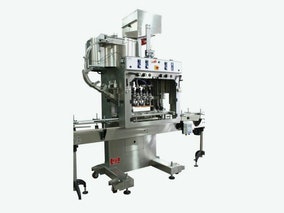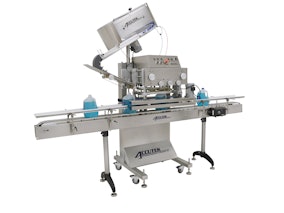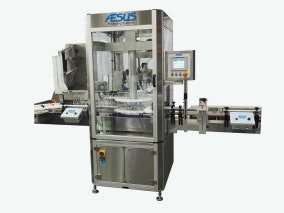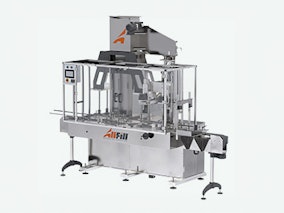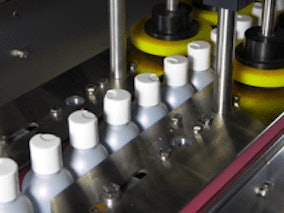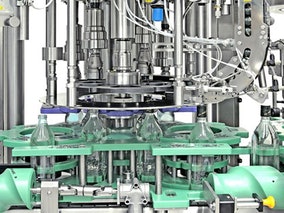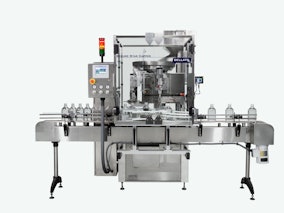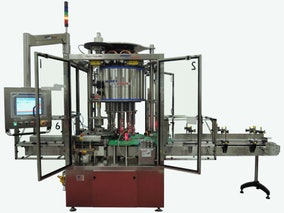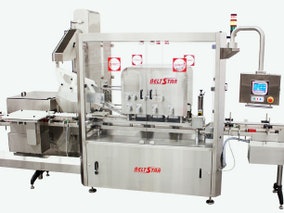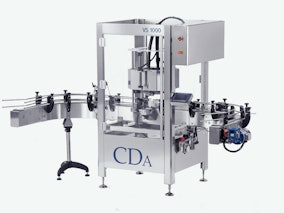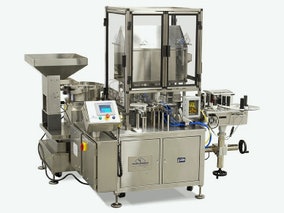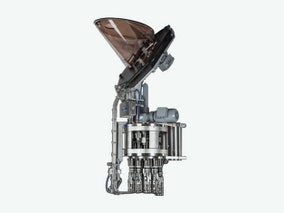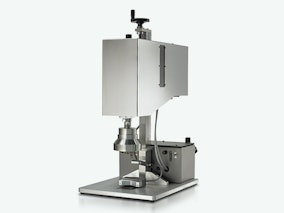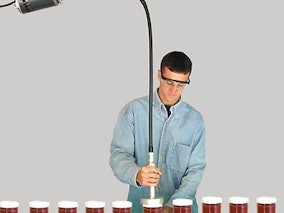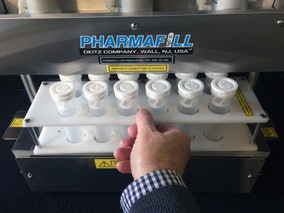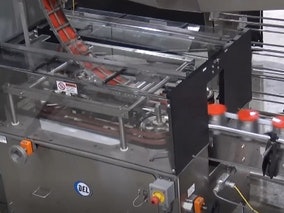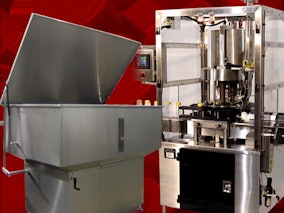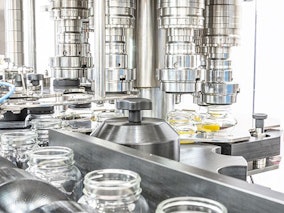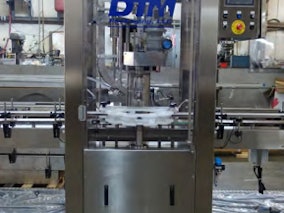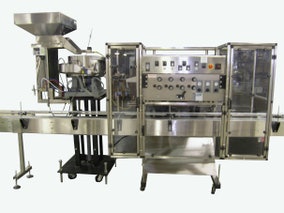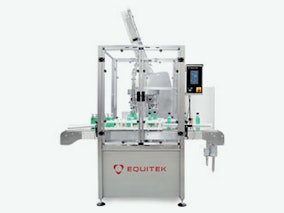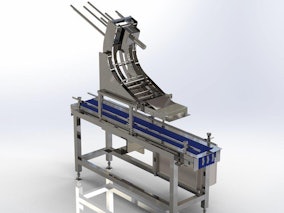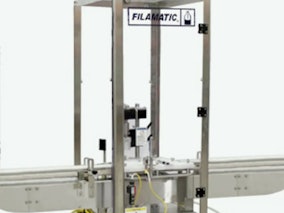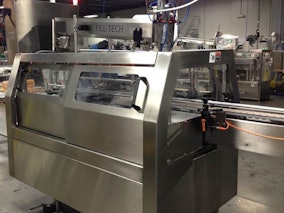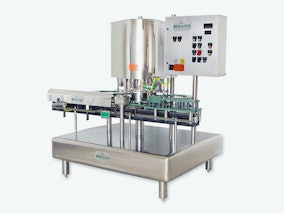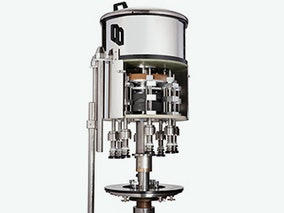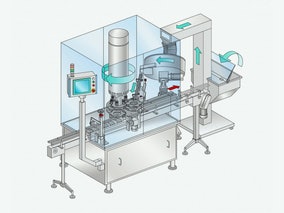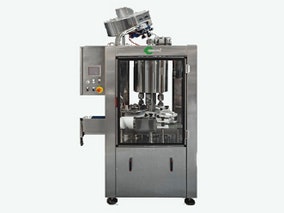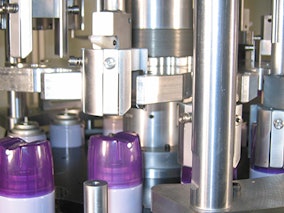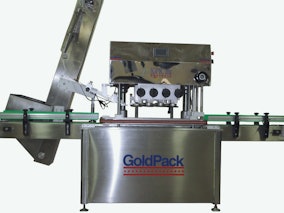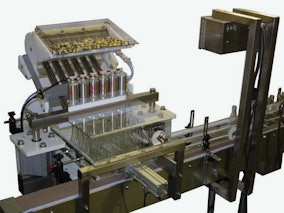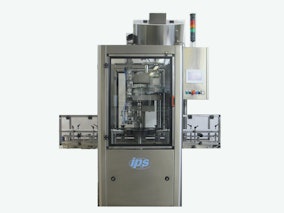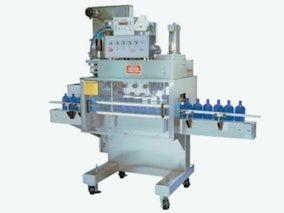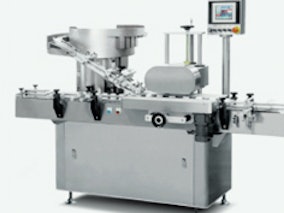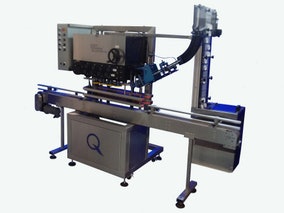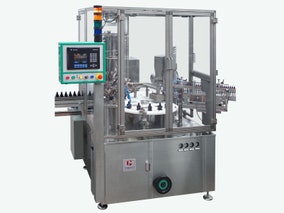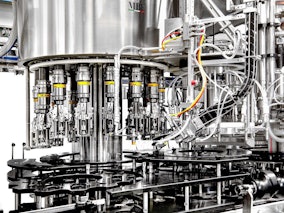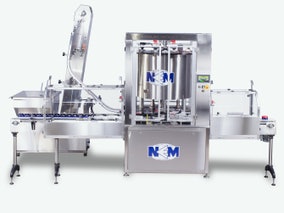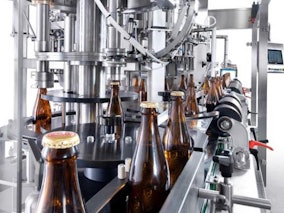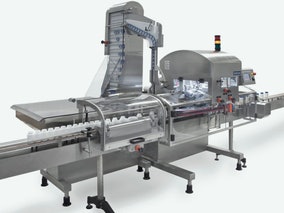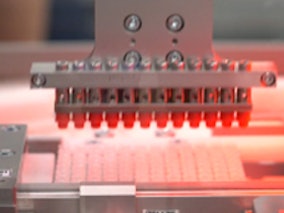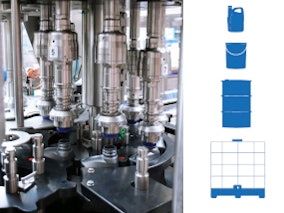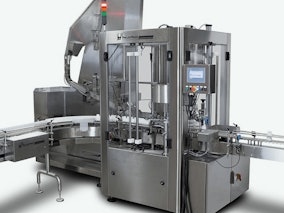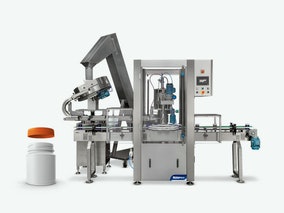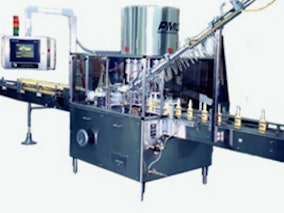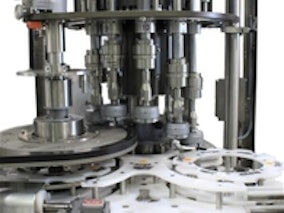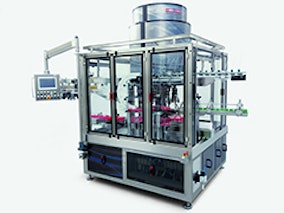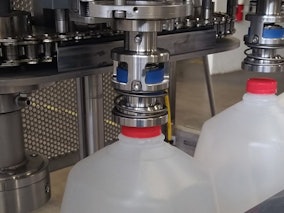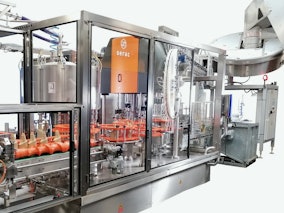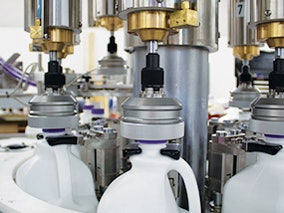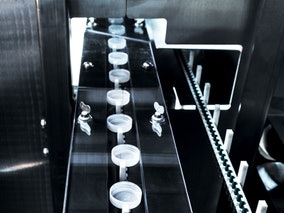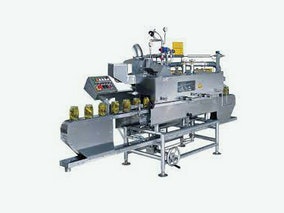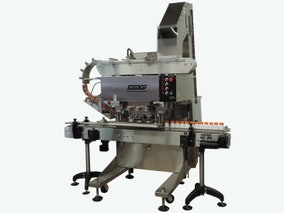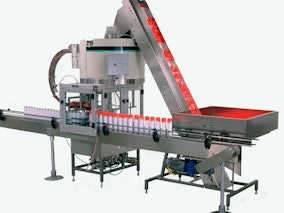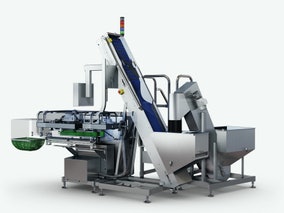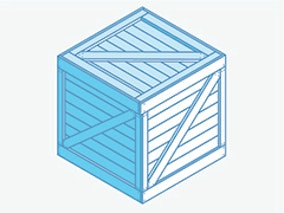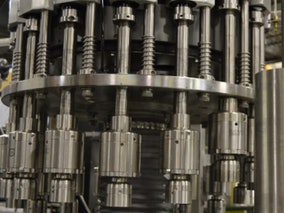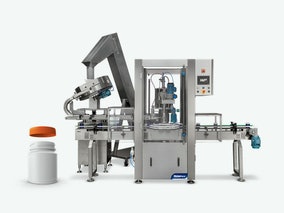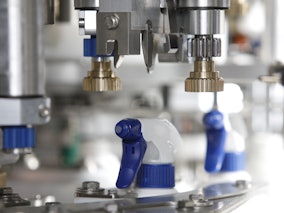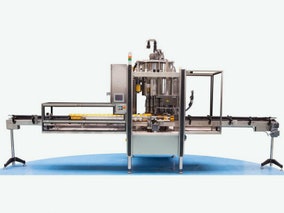Cappers
(61 companies)Packaging equipment that feeds and applies caps or other closures to plastic or glass bottles on liquid filling lines. Are you considering purchasing new filling, capping or closing machinery? Learn more about what to look for in your next purchase.
Cappers Companies
-

Acasi Machinery Inc
Acasi Machinery manufactures inline bottle capping machines focused on industries requiring bottle capping machinery that can produce from 10 to 200 bottles per minute. Acasi also makes related equipment such as cap tighteners, chuck cappers, push cappers and cap feeders. Featured models include the trucap inline capper, which can handle a wide range of caps and containers without change parts and is designed to be easier to set up than competing systems. Related cap feeding equipment includes floor level cap feeders, stainless steel hoppers, and an L-shaped conveyor for vertical and horizontal transportation of caps on the capping line.
You are currently not logged in -

Accutek Packaging Equipment Co., Inc.
Accutek Packaging offers a comprehensive range of capping machines designed for various applications and production capacities. Bottle cap machines are specifically designed to secure or tighten caps on containers. Every company involved in bottling products requires a reliable method to seal their containers, with caps being the most commonly used closure type. Accutek's capping equipment is versatile and capable of securing different cap types onto various bottle shapes. Accutek claims that its "cutting-edge bottle cap machines outperform the competition in terms of speed and precision." Accutek manufactures three distinct styles of capping systems: chuck cappers, spindle cappers, and snap cappers. From a handheld chuck capper with a single head for low-speed capping, all the way up to a high-speed 30-head rotary chuck capping system, Accutek's range of capping machinery caters to diverse needs and production demands.
You are currently not logged in -

Aesus Inc.
Aesus Inc. supplies several models of inline and starwheel cappers as well as retorquers and desiccant inserters for liquid, pharmaceutical, personal care applications and beyond. Featured machines include the Aesus Delta Starcap, an automatic, push-through two-station capper with servo-driven capping and torqueing stations. Engineered with one pre-spin station and one final torqueing station and an indexing starwheel, the Delta Starcap features pneumatic up/down slide tables for cap application. System runs bottles ranging from ¾ in. to 8 in. in diameter and 1- to 12-in. Tall. Comes standard with PLC controls and color touchscreen. Other capping systems from Aesus include the simple retorquer, single spindle capper, the Compact Star Capper, a two-station chuck capper, and much more.
You are currently not logged in -

All-Fill, Inc.
All-Fill offers models CS and CI automatic chuck cappers for bottle capping applications. Both of these fully automatic, two-station inline chuck cappers feature stainless steel and anodized aluminum construction with an integrated 4.5 square foot cap hopper. Units can also be seamlessly integrated with ancillary packaging equipment.
You are currently not logged in
-

Apex Filling Systems
Apex Filling Systems manufactures capping equipment designed to secure nearly any cap type onto a wide assortment of bottle types, including spindle cappers and tighteners, chuck cappers and snap cappers. Apex Filling Systems’ spindle cappers/spindle tighteners place and accurately torque flat caps, oval caps, flip top caps, pull spouts, safety caps, childproof caps, sport caps, and caps with over-caps or induction seals onto most bottle types, including PET, PP, PVC, HDPE, LDPE, and glass. Automatic spindle cappers handle almost any bottle type, with a modular design that allows users to start with just a cap tightener and easily add automation capabilities such as chute or automatic cap feeder later. Apex also offers handheld chuck cappers, an economical, portable cap tightener used to tighten hand-placed threaded caps.
You are currently not logged in -

AROL North America
AROL North America designs and builds an extensive range of capping, pluggers and closure machinery for applications across the food, beverage, pharmaceutical and chemical markets. Numerous models of capping equipment handle highly specialized applications, such as: systems for applying aerosol caps on personal care containers; can cappers for beverage filling lines; plastic flip-top closure application systems for personal care; mushroom and straight corking equipment for wine bottling lines; long plastic pressure cap systems for chemicals and home goods; and much many other machines.
You are currently not logged in -

BellatRx Inc.
BellatRx manufactures capping and torquing equipment for threaded, press-on or crimped caps with precision torque control. The Magna Capper is an automatic inline capping machine designed for large containers and closures. Also available are: the Secure Star Capper, an automatic high-speed starwheel cap applicator; the Secure Chuck Capper, an automatic in-line cap applicator; and the Prime Capper, an entry-level automatic inline cap applicator.
You are currently not logged in -

BW Packaging
Pneumatic Scale Angelus, a Barry-Wehmiller Packaging Company, offers mechanical servo and rotary capping machines, with a focus on machines for “marketing-style caps” for the personal care, food, beverage and chemical industries. PSA capping machines have a compact footprint, with stainless steel barrier guarding and interlocking access doors, and are available in standalone, freestanding turret, or monobloc configurations. PSA's mechanical rotary cappers are ideal for almost any application requiring pump caps, screw caps, press-on caps, plugs, and overcaps for glass, metal, plastic, and fiberboard containers. Machines provide accurate torque control through the use of magnetic torque units, and employ several anti-rotation measures to ensure that each container is securely held throughout the capping process, eliminating crushing, scuffing, slipping, or spilling.
You are currently not logged in
-

Capmatic Ltd.
Capmatic manufactures various retorquing and capping systems for a variety of liquid and semi-viscous filling applications in pharmaceuticals, cosmetics, personal care and other industries. Highlighted amongst Capmatic’s product catalog of dozens of cappers is the BeltStar servo-driven inline screw capper, providing extensive control and accuracy when handling the bottles and tightening the caps. BeltStar inline retorquers for screw cap, screw pump and tightening applications allows for programmable recipe-driven changeovers, displays true application torque, and provides 100% torque verification through the HMI.
You are currently not logged in -

CDA USA Inc.
CDA USA supplies automatic or semi-automatic capping/screwing machine, with or without distribution system of corks/caps, independent or integrated into a complete packing line. CDA offers a wide range of capping and screwing solutions for applications involving liquid and semi-liquid products: flat screw cap, spray cap, pump cap, pipette cap, security cap, beer cap and other drinks, twist off cap and more. CDA capping and screwing machines are suitable for a wide panel of caps and other closing systems used in sectors including food, beer, liquor, cosmetics, e-liquids, chemicals and more.
You are currently not logged in -

Chase-Logeman Corporation
Capping machines properly place or crimp closures onto bottles and vials of all shapes and sizes. Systems handle every type of closure: flat caps, eye dropper bulbs and nasal sprays.
You are currently not logged in -

Closure Systems International
Capping machines from Closure Systems International feature rated speeds of up to 50 bottles/min. and 3,000 bottles/hour per head. Product line features machines with 4 to 36 heads on multi-head cappers, all with corrosion resistant materials in the product zone. Capping systems are available as turret or freestanding machines. Featured cappers include the Series 5000 Combi, designed as a durable and versatile capper that can effectively apply a wide variety of closures, including aluminum caps, TSROPP, ROPP, screw caps, lug caps, ring pulls, and T-corks for glass, aluminum, and PET bottles.
You are currently not logged in
-

Cozzoli Machine Company
Cozzoli Machine Company’s line of cappers and crimpers for bottles include the CM Series Rotary Crimping Machine, a high-speed rotary crimping system that automatically caps and crimp seals aluminum closures at speeds of up to 200 or 400 containers a minute. As capped containers index into position, individual triple-roller crimping heads lower and tuck the skirt under with a gentle progressive roll, then raise as finished containers index out.
You are currently not logged in -

Crandall Filling Machinery Inc.
Crandall Filling Machinery supplies Kinex capping machines for bench-top bottle and jar filling operations. PS™ Pneumatic Bottle Cappers tighten screw and lug caps from 10 mm to 130 mm and are designed for applications where torque accuracy and repeatability are critical. SA™ Semi-Automatic Bench-Top Capping Machines are designed to eliminate the strain and fatigue associated with hand capping. Powered by a fractional horsepower AC motor, Kinetic Capping Machines are designed to be strong, capable of closing up to 50 bottles per minute.
You are currently not logged in -

Deitz Company Inc.
Pharmafill Cap Press CP3 capper by Deitz Company is designed to save time in capping bottles with press-on or snap-on caps. This semi-automatic bottle capper is engineered to press caps onto bottles fast and easily, replacing difficult, labor-intensive manual capping with a safe, simple approach that entry level workers can quickly master.
You are currently not logged in -

Del Packaging, LTD
Del Packaging manufactures a wide variety of rotary cappers and lidders for straight-walled canisters, tapered walled cups/tubs, and small vials or tubes. Del Packaging's equipment is designed to handle round, square, oval and odd shaped containers, caps, plugs and lids. In addition, DEL manufactures a wide variety of in-line overcapping machines for straight-walled canisters, tappered walled cups and tubs, and large pails. Overcappers handle round, square, oval and odd shaped containers, caps and lids.
You are currently not logged in
-

Dillin Automation Systems Corp.
Dillin Capping Systems designs, engineers, manufactures, and services straight line and rotary cappers for vacuum (wet or dry) and non-vacuum applications. Product line includes inline spin and steam vacuum cappers, cap blowers and related equipment. Dillin also offers high-performance capping heads with magnetic clutches, custom- designed bottle handling parts, and other special purpose equipment for a variety of applications, cap sorters, pneumatic parts feeders, incremental torque gauges, in-line cocked cap detectors and dud detectors, and other specialized items of equipment related to the capping process.
You are currently not logged in -

Dispac
The DISPAC Cappers are designed to deliver maximum reliability and robustness, utilizing high-grade stainless steel to meet the most demanding production requirements. With a capacity ranging from 3000 to 60,000 bph depending on the number of heads installed, these machines offer a high level of flexibility for small to large-scale production runs. In addition, DISPAC cappers boast a range of features that make them a smart investment for any production line. They can be used with various types of lids and containers, allowing for a wide range of configurations. Quick format changes can be made without the need for tools, making it easy to optimize production processes. The capping process is streamlined for maximum efficiency, with automatic distribution of caps in the down channel that is specifically adapted to each cap and speed. DIPAC engineers its machines to synchronize with the production line for easy handling by operators. Additionally, they require minimal maintenance, with low levels of greasing required, offering high durability while ensuring a long lifespan.
You are currently not logged in -

DTM Packaging, A Massman Company
DTM Packaging, a Massman Company supplies inline and rotary capping equipment, both new and remanufactured. Capping equipment for sale includes Purecap brand 1000 single head cappers, Purecap 2100 inline capper with centrifugal feeder, Purecap 2300 inline capper with waterfall feed system, Purecap 2000 cap tightener and Purecap dose cap placer. Other cappers for sale include servo cam pump cappers, remanufactured filler-cappers for shampoo, remanufactured level sensing filler with capper for 4-oz. hand sanitizer, capper/pluggers, pneumatic scale 6-head cappers and more.
You are currently not logged in -

E-PAK Machinery, Inc.
At E-PAK Machinery, choose from a selection of machines engineered for capping bottles of all types, including automatic vertical wheel pluggers, chuck cappers, snap cappers and spindle cappers.
You are currently not logged in
-

EQUITEK
Equitek´s in-line or rotary cappers, require the least possible operator´s engagement, allowing the end user to maximize resources. Practical and versatile capping machines are designed to handle different types of containers and caps with minimal tooling changes. Company offers either automatic or semi-automatic systems that properly secure caps using pneumatical, magnetic or pressure systems.
You are currently not logged in -

FEMC
FEMC's overcapping systems are used to apply snap-on caps for a variety of circumstances, either following a heat sealing application or as a primary method of sealing package contents. Robotic capping solutions are also available.
You are currently not logged in -

FILAMATIC
Filamatic makes closing and capping systems for a wide range of applications. The Filamatic product line includes single and dual head cappers, servo cap tighteners as well as belt wheel capper, single/dual station servo chuck capper, rotary plugger/capper and rotary plugger/stopper machines. Featured products include the single or multi-head chuck, standalone CT-100 and CT-200 pneumatic, conveyed and indexed capping machines, designed to provide nearly all of the perks of fully automated, customized cappers but at an economical price. The Servo Chuck Capper is a servo-motor driven/PLC controlled capper designed to provide precise application torque and servo controlled feedback and automatically apply and tighten the cap to the desired application torque at 30 cpm; dual head capper handles up to 50 cpm.
You are currently not logged in -

Fill-Tech Solutions Inc.
Fill-Tech OC series of overcapping systems is designed to provide reliable, trouble-free application of wipe on or snap-on lids. With speeds ranging from 120 up to 350 containers per minute, the OC series offers a solution for nearly any application. Engineered for container control and lid delivery, the OC series handles captivator blocks, timing screws, stabilizer belts or a combination of these, with care and speed.
You are currently not logged in
-

Filler Specialties, Inc.
Filler Specialties offers a full line of standalone rotary container cappers for handling screw caps, press-on caps, snap/screw caps, flat caps, sport caps, foil caps and specialty closures. Models range from three head to 30 head units to meet the capping requirements with speeds up to 700 containers per minute.
You are currently not logged in -

Fogg Filler Company
Offering a variety of turrets, Fogg capping machines handle multiple capping applications. Fogg capping equipment technologies include pick-in-place, articulating jaw and ROPP cappers. Fogg systems can also run flat screw, sport, snap and snap screw closures on the same bottle capping machine, with Fogg’s change parts making changeover quick and easy. Fogg reports its cappers can cap 99% of caps in the industry and can be integrated with customers’ fillers, or sold as a standalone unit.
You are currently not logged in -

groninger
groninger manufactures a vast array of closing and sealing equipment for pharmaceuticals, cosmetics, health care and other markets. Its fully automatic, continuously operating high-speed closing machine is designed for cosmetics applications and handles round, flat and formed glass bottles and a wide range of closures. Machines feature gentle processing of bottles and closure components, can processing of up to 3 different closure elements simultaneously and reach outputs of up to output up to 18,000 units/hour with a toolless changeover.
You are currently not logged in -

Grupo Empac SA de CV
Grupo Empac SA DE CV offers a range of automatic and semi-automatic capper machines.
You are currently not logged in
-

Haumiller Engineering
Haumiller Engineering 's Haumiller 4200 Overcapper is a 6-pocket continuous motion machine built for aersol overcapping applications. System handles cans with quick-disconnect, anti-static can guides and star wheels. System handles a maximum of 180 parts per minute.
You are currently not logged in -

IGPR Inc.
Industrias GOLDPACK S.A. manufactures an automatic screw capping system consisting of a conveyor, cap orienter, cap placement system and screw capping machine that uses eight torque wheels.
You are currently not logged in -

Inline Filling Systems, LLC
Inline Filling Systems designs and engineers a wide range of automatic and semi-automatic capping machines, crimp cappers, pluggers and cap tighteners. Highlights from the company's vast line of cappers include: an automatic crowner with a six-head position design that simultaneously presses six standard 26mm crowns onto glass bottles; a fully automatic snap capper applies and snaps non threaded caps onto containers for "NEPCO" and related snapcaps used in aerosol packaging operations; and a semi-automatic benchtop snap capper designed to mount onto a conveyor or slide tray and activated by foot switch to press snap caps into place one at a time.
You are currently not logged in -

Integrated Packaging Systems
Rotary chuck cappers are known for having a more positive application of bottle closures with less incidents of skewed or miss-threaded caps and more consistent application torque. The IPS Cleanpack screw cappers using chucks are competitively priced and offer quality in-line capping with higher throughput and consistency. Chuck cappers from IPS are less prone to jamming, with more positive application of bottle closures and facilitate smoother production runs. Constant-smooth magnetic chuck is designed to provide a more consistent application torque.
You are currently not logged in
-

Kaps-All Packaging Systems, Inc.
Kaps-All manufactures a broad range of capping, overcapping, retorque, lidders and hand capper machines for numerous applications and speeds. Models include the A6 Spindle Auto Capper, a fully automatic machine that handles screw caps of all materials and styles from 8mm to 120mm including pilfer evident and child resistant cap closures. Model FA6 Portable 6 Spindle Cap Tightener and Retorquer, for pump and trigger cap tightening, runs at speeds of up to 300 bpm and requires only 38 in. of line space. Model BE4-Portable Over Capper/Lidder handles over caps, lids and fitments of all materials and styles from 13mm to 70mm.
You are currently not logged in -

Key International, Inc.
Key International distributes Countec bottle capping equipment used in pharmaceutical, nutritional supplement and other industries. Featured cappers include the Countec CT-OC-120 press-on capping machine, a fully automatic machine that loads caps into a vibratory bowl feeder before aligning and feeding them to the chute escapement. As containers pass along the conveyor, they are gripped by adjustable side belts. Other machines include the Countec CT-RC-120 rotary screw capping machine, featuring a precise pick-and-place mechanism that ensures trouble free operation. It has 4 capping heads configured to handle up to 120 bottles per minute.
You are currently not logged in -

Liquid Packaging Solutions, Inc.
Liquid Packaging Solutions manufactures capping machinery to meet the needs of the specific closure for any given project, from ROPP to screw-on, snap and corks, LPS offers automatic, semi-automatic and manual options.
You are currently not logged in -

Marchesini Group USA Inc.
Marchesini Group USA supplies a range of vial and bottle capping machines for the pharmaceutical industry and beyond.
You are currently not logged in
-

MBF North America Inc.
MBF manufactures the Capmatic/Crownmatic series of capping machines/turrets, featuring a wide selection of cap orientation and distribution systems as well as capping heads and bottle handling and management systems, is designed to offer versatility and functionality for each type of cap, bottle and production speed. Cappers are available as standalone units or as turrets in the cylinder block. Capmatic V is a F100/4 capping head for ROPP screw caps, with four rollers and mobile or fixed capping press and a “no-cap/no-roll” safety system. The Capmatic M90 screwing head is designed for plastic pre-threaded screw caps, featuring a magnetic coupling to adjust torque.
You are currently not logged in -

New England Machinery, A Massman Company
New England Machinery (NEM) manufactures a full line of capping systems including bottle capping machines, container capping equipment, and cap sorters for a wide variety of applications. NEM’s capping machines and bottle cappers tighten screw-caps and lug-type caps, close oriented and non-oriented push-down closures, and secure plugs, fitments and lids, to ensure all are securely placed on the customer's bottle or container.
You are currently not logged in -

Newmapak Ltd.
Newmapak distributes cappers for low-volume or high-volume applications, carefully considering various aspects of product requirements. Factors such as filling speeds, temperature, and the integrity of the finished product are taken into account to provide solutions tailored to both the food and beverage industries.
You are currently not logged in -

NJM Packaging
NJM Packaging’s Capper family includes both in-line belt, in-line disc and rotary continuous models. NJM provides a number of features and options to suit any operation, including a variety of cap feeders, elevators and chutes. All cappers feature stainless steel, heavy-duty construction and the latest in controls. Compact design makes them easy to incorporate into packaging operations. In addition, NJM also supplies retorquers as in-line belt or in-line disc type to reapply the cap to the proper torque after induction sealing.
You are currently not logged in
-

Norwalt
Norwalt’s patented continuous flow tray PCR Tube Capping/Tray Loading system is designed for high-speed operations. Applications include medical devices, test kids, or bespoke products.
You are currently not logged in -

PACK'R
PACK'R specializes in designing and manufacturing state-of-the-art capping machines. Its product line delivers precision capping machines in three versatile systems: linear, rotary, and robotic. Whether it's bottles, jerrycans, cans, or pails, PACK’R’s capping equipment ensures efficient and reliable sealing, tailored to diverse packaging needs. Featured machines from the PACK’R capping machine line include the The PACK’R PULSA-S Filler Capper, which fills containers of 500ml to 20L capacity, provides outputs of up to 18 CPM, and can handle screw caps, flex spouts, push-on caps, lids, bungs and tab seals.
You are currently not logged in -

PallayPack Inc
Rotary chuck type cappers help bottlers eliminate missing caps and cross-threaded caps on the filling line. PallayPack’s chuck cappers are designed to improve and maintain cap application torque throughout production without adjustments. Compact and requiring less change parts because one set can be used for a range of bottles and caps, chuck cappers feature fast changeover times. After capping is complete, no further adjustments to dial in the torque are needed. Rotary cappers are recommended when production speed is over 60 bottles/min. and for longer production runs.
You are currently not logged in -

Paxiom Automation, Inc.
Paxiom Group provides capping solutions that unscramble bottles, cap containers and ensure caps are induction sealed. Paxiom’s family of automatic capping machines, engineered for medium to high-speed requirements, is ideally suited for industries such as snack food, confectionery, beverage, pharmaceutical and cannabis, among others. Rotary cappers are capable of accommodating many container sizes and can meet production rates from 10 to 150 cycles per minute depending on the specifics of container and cap.
You are currently not logged in
-

PMC Industries
PMC Industries specializes in pump cappers and crimper machines for products ranging from household goods, cosmetics and aerosol products to personal care items such as lotion and finger pump liquid products. Product line includes several models, such as the PMC Pump Capper, designed to apply all styles of pump caps while also handling many other styles of closures at speeds from 60 to 300 caps/min. Other models include the ERC-1600 capper, for spout pumps and lotion pump capping applications, dispensing pumps up to 2 liter sizes and the Trigger Capper/Screw Capper, running trigger pumps, screw caps with diptubes and flat screw caps on the same machine with fast changeover.
You are currently not logged in -

Pneumatic Scale | Angelus
Pneumatic Scale | Angelus (PSA) makes a line of capping equipment including mechanical rotary capping machines such as the TC capper, which handles a wide range of screw caps, press-on caps, plugs, and overcaps. PSA also makes servo rotary cappers, designed for almost any application requiring pump caps, screw caps, press-on caps, plugs, and overcaps for glass, metal, plastic, and fiberboard containers.
You are currently not logged in -

Ronchi America, LLC
The SIRIO family of capping machines covers a very wide range of capping applications, offering servo-driven as well as mechanical solutions capable of applying closures used in the personal care, detergent, pharmaceutical and food products industries.
You are currently not logged in -

SAUTEM LABELLERS & CONVEYORS, S. de R.L. de C.V.
SAUTEM LABELLERS & CONVEYORS, S. de R.L. de C.V. distributes equipment for an entire packaging line, including chuck style cappers with torque regulators. GEB will also supply related equipment such as cap elevators, filling equipment, conveyors, labelers and accumulation tables.
You are currently not logged in
-

Serac Inc
Serac capping machines, available in monobloc or standalone configurations, have advanced features for liquid filling lines. They can handle multiple closure types effortlessly including screw, plug, pump, and trigger caps. Machines feature torque control on the HMI, and a rejection system for quality control. Versatile rotary filler-cappers ensure accurate filling, longevity, and easy cleaning. Machines can accommodate containers ranging from 100g to 60kg, made of PET, PP, PS, aluminum, glass, and more. Outputs of up to 42,000 containers/h (1 L) reported.
You are currently not logged in -

Shibuya Hoppmann
Filling and capping systems from Shibuya Hoppmann are designed to ensure customer satisfaction and consumer safety. Product line of servo and mechanical cappers are used in a wide range of applications, such as aseptic filling and capping for beverages. Shibuya Hoppmann also manufactures filling and capping systems for dairy, soy sauce as well as a cleanser filler and capper system for personal care products.
You are currently not logged in -

Sidel Inc.
The Sidel Super Combi monobloc series that integrates five process steps – preform feeding, blowing, labeling, filling and cap feeding – into a single system. The Sidel Super Combi Compact machine is designed and engineered to reduce the footprint and enhance the efficiency of water, carbonated and beverage lines. System maximizes water production and reduces total cost of ownership (TCO). It is 30% more compact, integrating all process steps with no conveying. New EvoFILL HS Still filler with proportional filling valve ensures 30% faster output.
You are currently not logged in -

Silgan
Silgan supplies eight application-specific models of cappers, ranging in top speed capacities from 200 to 1500 containers/min. All cappers feature stainless steel design for easy cleaning and maintenance. Line of capping equipment includes vapor vacuum capping/sealing systems, semi-automatic vapor vacuum sealers, compact inline cappers and more.
You are currently not logged in
-

SUREKAP, LLC
SureKap’s most popular fully automatic capper utilizes the latest technology to automatically place and precisely torque a wide spectrum of cap types onto virtually any bottle style. Designed for maximum efficiency and versatility, this straight line, six-spindle capper features a new non-vibratory, high speed belt feeder with floor-level loading and a heavy-duty stainless steel frame.
You are currently not logged in -

Terco Inc.
Terco specializes in the manufacture of equipment for aerosol and liquid filling equipment, including overcappers for aerosol can packaging. Featured machines in the Terco product line include the Model RO-150-C Rotary Overcapper, a six-head rotary system designed to place and secure overcaps at rates up to 150 cans per minute. Configured with a continuous motion drive system, these machines feature an explosion proof, variable speed drive system. With simple set-up and robust construction, these units are designed to meet the needs of automated aerosol filling production. Each system comes standard with an air driven centrifugal sorter bowl to sort, orientate, and feed a wide variety of overcaps. Available upgrades include bulk feed elevators, “no-cap” detection, and sanitary/dairy construction.
You are currently not logged in -

Tetra Pak Inc.
Tetra Pak has a wide range of cap application systems that handle closures for portion packs, family packs, chilled and ambient solutions. Among Tetra Pak’s capping systems are the Capper 30 by Trepak 0100, for running Tetra Pak E3 packaging, featuring a high-capacity storage cap hopper, additional stand-on platform for the operator and a high-speed cap elevator.
You are currently not logged in -

Turbofil Packaging Machines
TurboFil offers a full line of bottle capping systems ranging from handheld to capping equipment for fully automated production lines, including systems that handle crimp caps, screw caps and tamp-on caps for all sizes of containers and production speeds in the pharmaceutical, cosmetics, chemicals and other industries. New inline capper is designed to be a cost-effective solution for servo-controlled capping. This machine can be mounted on the customer's existing conveyor (or a TurboFil-supplied one) and can be supplied as a fully automatic machine using a cap feeder or as a manually loaded operation. TurboFil's Acrobat chuck capper reaches rates of 80 bottles per minute, combining the benefits of flexibility and easy changeover of a spindle capper with the precise torque and reliable cap handling offered by chuck cappers.
You are currently not logged in
-

U.S. Bottlers Machinery Co.
From pumps, to straws, to laundry detergent spouts, USB manufactures custom-made rotary cappers to apply a broad range of cap types, shapes and sizes. Offered in a 14-in. pitch diameter, up to 40-in. for speeds up to 1000 bottles/min., U.S. Bottlers cappers can be built as standalone machines, or integrated into a monobloc/tribloc configuration to combine with its line of fillers. Featured products included the Rotary Chuck Style Capper, designed to apply and rotate a pre-sorted cap on a container, based on a predetermined applied torque. Other models include the High-Speed Capper (HC) and the Rotary Overcapper. In addition, U.S. Bottlers offers filler and capper technology in one simplified, integrated monobloc system.
You are currently not logged in -

WeighPack Systems, Inc. / Paxiom
Weighpack Systems provides capping solutions that unscramble bottles, cap containers and ensure caps are induction sealed. Weighpack's family of automatic capping machines, engineered for medium to high-speed requirements, is ideally suited for industries such as snack food, confectionery, beverage, pharmaceutical and cannabis, among others. Rotary cappers are capable of accommodating many container sizes and can meet production rates from 10 to 150 cycles per minute depending on the specifics of container and cap.
You are currently not logged in -

WEIGHTPACK, Inc.
WeightPack's wide range of capping machines is designed to handle various types of caps, including screw caps, ROPP caps, press-on caps, as well as trigger sprayers and pump dispensers. With cutting-edge technology and precision engineering, customers can trust WeightPack to deliver consistent and reliable performance every time.
You are currently not logged in -

Zalkin, A ProMach product brand
Zalkin designs and manufactures high-performance capping and cap handling systems – from a 5 mL-vial to a 5-gallon container. Zalkin capping technology addresses the full range of application needs for a wide variety of industries. Zalkin & beltorque® offer a full range of freestanding cappers capable of repeatably and reliably applying a wide range of closures to virtually any rigid package. Zalkin’s line of capping systems typically include a combination of capping heads, cap applicator, cap orienter, cap elevator and a cap conveyor.
You are currently not logged in
Report an Issue
Incorrect/inaccurate categorization? Report inaccuracies or problems »
Related Filling, Capping & Closing searches
More on Cappers
As a key machine-type used by manufacturers in the consumer packaged goods (CPG) market, capping systems continue to evolve to meet customer preferences. At their most basic, they’re used to apply airtight caps that enhance the shelf life of products in bottles, and protect the contents from contamination. Beyond that, they also provide a unique piece of packaging real estate to increase visibility on store shelves. It's no wonder that capping machines can have a major impact on CPG companies’ success.
Perhaps the most common application for capping equipment is on liquid filling lines, where the machines apply caps or other closures to bottles. Various types of capping equipment are used in the industry. Crown cappers are machines that apply metal crown seals, also known as crown corks, over the tops of bottles, such as in beer bottle capping. Roll-on cappers are used to apply aluminum roll-on pilfer proof (ROPP) caps for tamper-evident sealing, such as aluminum caps for non-alcoholic sparkling grape juice. Press-on cappers are specialized machines that apply snap-on or push-on closures to the mouth of a container, such as child-proof aspirin bottles.
Other widely used types of capping equipment include screw cappers, which apply threaded plastic caps that are twisted down to a set torque, such as plastic capping for most soda bottles. Overcappers are packaging machines that apply outside caps over a container with a plug, pump, or other type of seal, such as a protective cap applied to a pump hairspray product. Retorquers are machines that tighten lug or screw cap closures into the body of a product after the closure has been placed over the open mouth, in applications like tightening a nozzle closure into the bottle of a plastic bottle of household cleaner.
There are numerous considerations used to evaluate capping equipment, most notably secure sealing. For non-absorbent, solid containers such as e-liquid bottles and beverage cans, in-line cappers are crucial. They’re designed to securely close all sizes of containers with lids and closures that provide strong sealing capabilities, preventing product spillage and spoilage.
Some applications require a rather sophisticated capping mechanism. Aseptic capping equipment is one such example. It’s a must for any CPG product that needs to be kept air-tight, sanitary, or requires a high level of accuracy in their labeling, such as cosmetics and medications. To safely achieve optimal efficiency, manufacturers should consider using these cappers to apply the lids in a specially designed, well-controlled environment. This helps manufacturers to guarantee that their product packaging and labeling meets all relevant safety regulations.
Certain product categories, such as chemical products, require capping machinery like crimp cappers or snap-on capping equipment that can be used to apply closures such as leak-proof screw caps, flip caps, and safety caps. These provide strong seals that mitigate spillage or damage during shipment and long-term storage. These are ideal for companies whose products' viability and livelihoods rest on their packaging’s integrity, withstanding extended shipping periods, changes in air quality or other volatile external elements.
Lastly, there are manufacturers who require capping machines to apply tamper seals, often using by heat-sealing methods. This provides consumers with a level of reassurance, with a prominently placed visible seal on their products to indicate that their CPG product has not been tampered with in the time since leaving the production facility.
For CPG companies, co-packers and bottlers alike, capping machines offer more than applying a closure on a bottle in a cost-effective manner. They’re an additional means by which you can grow and protect a brand’s reputation, while ensuring that customers receive the highest quality product.
PPMI’s ProSource directory provides you with access to our trusted partners that manufacture and supply capping machines and related systems. Browse through our catalog today, and find the capper that keeps your production line competitive.
